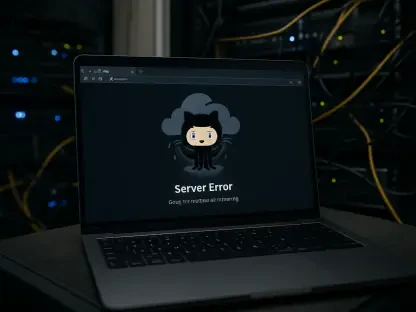A critical security issue within the Kubernetes platform has recently been addressed, bringing attention to the ever-evolving landscape of cybersecurity. This vulnerability, tracked as CVE-2024-9042, was discovered by Akamai researcher Tomer Peled. It enables remote attackers to execute code with SYSTEM privileges on Windows endpoints in a Kubernetes cluster, posing a significant risk to the integrity of affected systems. The flaw arises from insufficient sanitization and validation of a pattern parameter within the Log Query mechanism—a beta feature intended for querying system status through command line interfaces or web APIs. This revelation highlights the ongoing challenges and importance of maintaining secure coding practices in complex environments.
The Nature of CVE-2024-9042
Discovery and Implications
The discovery of CVE-2024-9042 sheds light on the potential repercussions of security lapses within robust systems like Kubernetes. During Tomer Peled’s research for the DEF CON security conference, this vulnerability surfaced as a noteworthy concern. The Log Query feature, which allows administrators to query system status, was found to be inadequately sanitized and validated. Consequently, remote attackers could craft malicious payloads that exploit this weakness, potentially compromising the entire Kubernetes cluster. The gravity of this vulnerability stems from its ability to grant SYSTEM-level privileges, equating to full administrative access on Windows nodes within the cluster.
Despite its medium-severity rating and a score of 5.9 out of 10, the ease of exploitation is particularly alarming. Kubernetes versions earlier than 1.32.1, with beta features enabled, are susceptible to this flaw. Clusters running Windows nodes with the Log Query feature are specifically at risk. Peled emphasized the urgency of addressing this issue promptly, noting that while there have been no reported instances of exploitation, the public disclosure of the vulnerability could potentially lead to an increase in attacks.
Actions Taken and Security Advisory
Recognizing the potential danger, the Kubernetes project swiftly issued a security advisory recommending immediate updates to affected systems. Users were advised to update to the latest version to mitigate the risk posed by this vulnerability. Additionally, the advisory suggested checking audit logs for unusual Log Query inputs, which could indicate attempted exploitation. This proactive measure is intended to help administrators identify and respond to any suspicious activities that may arise following the vulnerability’s disclosure.
Interestingly, Peled’s detailed analysis not only highlights the necessity of patching but also underscores a broader lesson in securing code and maintaining vigilance. The specific conditions required for exploitation may seem niche, but they serve as a reminder that even seemingly minor oversights can lead to significant security breaches. For Kubernetes users, especially those managing Windows nodes, prompt action and ongoing monitoring are crucial to protecting their systems.
Broader Implications and Best Practices
Linux Systems and Other Vulnerabilities
Notably, the vulnerability CVE-2024-9042 does not affect Linux-based Kubernetes deployments. This distinction is crucial for administrators managing diverse environments, as it allows them to prioritize their efforts based on the specific configurations of their systems. With the Log Query feature being confined to Windows nodes, Linux clusters remain immune to this particular flaw. However, this should not lead to complacency; other vulnerabilities may still pose threats across different platforms.
The security advisory also referenced related security concerns, such as vulnerabilities affecting Nvidia and Cisco products. By framing CVE-2024-9042 within the broader context of cybersecurity, the advisory reinforces the need for consistent and comprehensive security practices. Whether dealing with Kubernetes or other technologies, staying informed about potential threats and applying timely patches are essential strategies in mitigating risks.
Lessons in Secure Coding and Vigilance
The resolution of CVE-2024-9042 offers valuable insights into secure coding practices and the importance of rigorous validation and sanitization procedures. The vulnerability’s emergence from a beta feature underscores the necessity of thoroughly vetting all aspects of code, even those still in development stages. Peled’s research exemplifies the diligence required to uncover and address potential weaknesses before they can be exploited maliciously.
Moreover, the incident highlights the benefits of collaborative efforts in the cybersecurity community. By sharing findings and issuing advisories, researchers and developers can collectively enhance the security landscape. This collaborative approach not only helps in addressing immediate threats but also fosters a culture of proactive security management. Organizations and individuals alike are encouraged to remain vigilant and adopt best practices in coding, system configuration, and monitoring to safeguard against emerging threats.
Future Steps and Considerations
Enhancing Security Measures
In the wake of CVE-2024-9042, the need for robust security measures within Kubernetes and similar platforms has been underscored. Administrators should prioritize regular updates and patches as integral parts of their maintenance routines. The importance of staying ahead of potential vulnerabilities cannot be overstated, especially as threat actors continuously evolve their tactics. By implementing stringent security protocols and remaining informed about the latest advisories, organizations can better protect their systems from exploitation.
Additionally, this incident has highlighted the value of beta features as both opportunities and risks. While they can introduce valuable functionalities, they also require thorough scrutiny to ensure that they do not inadvertently create vulnerabilities. Careful testing and validation, coupled with a proactive stance on security updates, can help in balancing innovation with safety.
Moving Towards a Secure Future
A significant security issue within the Kubernetes platform has recently been resolved, drawing attention to the constantly changing landscape of cybersecurity. This vulnerability, officially tracked as CVE-2024-9042, was initially discovered by Akamai researcher Tomer Peled. The flaw permits remote attackers to execute code with SYSTEM privileges on Windows endpoints within a Kubernetes cluster, presenting a considerable threat to the integrity of the affected systems. The root of the issue lies in the inadequate sanitation and validation of a pattern parameter contained within the Log Query mechanism. This mechanism is a beta feature designed for querying system status through command line interfaces or web APIs. This finding underscores the ongoing challenges and the crucial importance of maintaining rigorous secure coding practices in sophisticated environments. It serves as a stark reminder of the persistent need for vigilance in the ever-evolving realm of cybersecurity.









